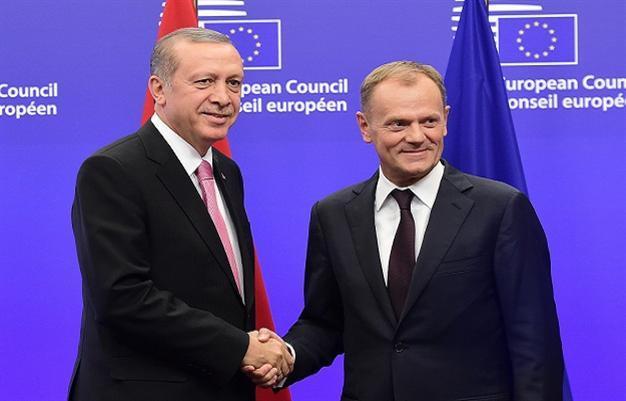EU to hold summit on migrants with Turkish president, offers Turkey 3 bln euros for migrants
VALLETTA

Turkey's President Recep Tayyip Erdoğan (L) is welcomed by European Council President Donald Tusk at the European Council in Brussels, on October 5, 2015. AFP PHOTO / EMMANUEL DUNAND
The European Union will host Turkish President Recep Tayyip Erdoğan in a summit to discuss ways of stopping migrant flows to the bloc, with the union offering 3 billion euros to help Ankara host more than 2 million Syrian migrants in its country.
EU leaders, who were in Malta for a two-day summit to reach an agreement with African countries to help them cut the migrant flow, also agreed on Nov. 12 to invite Erdoğan to a summit most probably at the end of the month as they seek his help to stem a chaotic flow of migrants that threatens Europe’s unity and open borders, Reuters reported.
Though details have yet to be finalized, German Chancellor Angela Merkel said there was consensus on the 3 billion euros offer for 2016 and 2017 to improve conditions for the more than 2 million Syrian refugees in Turkey.
The union’s executive commission proposed 500 million euros from the EU budget and asked member states for the rest. Merkel said precise budgeting was yet to be done, while diplomats said several governments had reservations about contributing.
On offer are, alongside the 3 billion euros, a broadening of Turkey’s long-stalled EU membership talks to include economic policy and thus open new chapters, and critically for many Turks, more visa-free travel to Europe. In return, the EU wants Turkey to improve conditions for Syrian refugees and curb transit by Asians seeking to reach Europe in the hope of better paid work.
Daily Hürriyet reported on Nov. 13 that Germany was the country that would contribute the most to the offer, with 534 million euros.
The EU-Turkey summit would, Merkel said, “demonstrate that we will work very closely with each other and that we sensibly share out the challenges arising from the civil war in Syria.”
Donald Tusk, the European Council president who chaired the emergency meeting of EU leaders in Malta, warned that they must win a “race against time” to slow arrivals via Greece if Europe is to save the Schengen zone of passport-free travel inside the bloc from being throttled by new national barriers and controls.
At the meeting, which followed a summit on the same topic with African counterparts, leaders were briefed on negotiations with Ankara the EU executive and gave the green light to wrapping them up.
The Hürriyet Daily News reported on Nov. 13 that Turkey and the EU Commission had agreed on a refugee action plan that would include short- and medium-term measures following necessary approval by political leaders, citing a high-level EU official, who wanted to remain anonymous.
The initial agreement was secured during lengthy meetings conducted by EU Vice President Frans Timmermans and Turkish senior officials on Nov. 11 in Ankara as a result of nearly three months of negotiations.
Tusk said a summit in Brussels involving Erdoğan and the 28 EU leaders would take place at the end of November, of which he was “99 percent sure.”
European diplomats say organizing a summit-level platform for Erdoğan to meet his EU counterparts has been an important element in talks.
Greek Prime Minister Alexis Tsipras, whose country has been overwhelmed by over 600,000 migrants reaching its islands from Turkey on their way to Germany and northern Europe, said it was clear the EU’s salvation lay with Turkey, a NATO ally and would-be first Muslim member of the European Union.
“It is obvious that the only real chance of stopping these flows is reaching an understanding with Turkey,” Tsipras said.
Hungarian Prime Minister Viktor Orban said Nov. 12 that European incentives meant to spur Turkey to stem the flow of migrants by boosting border security shows that the “once proud” continent has become “a beggar pleading for security from someone else.”
Orban said the bloc would be negotiating from a position of weakness and should first set up its own “sustainable line of defense” against the migrant flow.
Orban opposes immigration and says Europe’s Christian identity is at risk from the many Muslim migrants.
